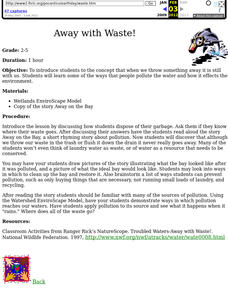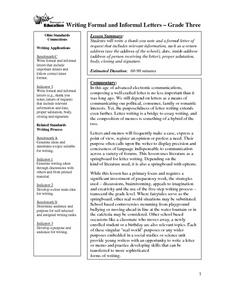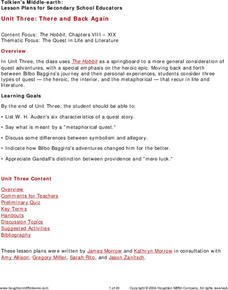Curated OER
Math: Methods of Measurement
Fourth graders practice linear measurement skills by applying various measuring instruments to determine the heights of classmates. By measuring the heights of second graders and fourth graders, they construct tables of height and age...
Curated OER
Treading Lightly on Flag-Waving
Young scholars explore the impact of world events on past Olympics as a springboard for understanding the cultural, political, and social climate surrounding the 2002 Winter Olympics after the events of September 11, 2001.
Curated OER
Using Artwork to Develop Personal Narratives
Students use a work or art as a springboard to a personal narrative or descriptive writing. They represent an idea in an artistic product which connects to composition.
Curated OER
Knights and Castles and Kings Galore
Fifth graders create a fairy tale story with emphasis on castles. After reading various texts featuring castles and their residents, 5th graders complete a book report project. The book report serves as a springboard to the writing...
Curated OER
Famous Hoosiers: Madam C. J. Walker
Students study Madam Walker's contribution to Indiana and US history. They study how important women have been in Indiana's history through this series of lessons.
Curated OER
Political Protest Through Art
Students examine how artists (painters or cartoonists) use artwork as a means of disseminating a political point of view in this lesson that uses primary source documents and examples of political cartoons.
Curated OER
Where Do Animals Come From?
Students use library search engines to research an animal and its origin. In this animal research lesson, students research their assigned animal using ProQuest. Students then find the country of origin of the animal using a library...
Curated OER
Putting It All Together
Learners organize their daily observation logs to write a nonfiction piece. They compare and contrast Saturn to other planets or write a summary. They use this piece of writing in future lessons.
Curated OER
The Water Cycle and Watershed
Students summarize the steps in the water cycle. In this earth science lesson, students create a skit, song or poem showing the various components of the cycle. They identify the different watersheds in their area.
Curated OER
Away with Waste!
Students read and analyze the story Away on the Bay as a springboard to discuss water pollution. They may look into ways in which water can be cleaned and a watershed restored.
Curated OER
Calling All Units
Explore the history of the portable cell phone as a springboard to investigating other technological innovations that significantly impact our everyday lives. Identify different types of technology used in everyday life and explore how...
Curated OER
Spelling: ie and ei words
Fourth graders practice spelling "ie" and "ei" words. In this review of spelling, 4th graders discuss different "ie"/"ei" words and the old saying "i before e except after c" and it's accuracy. This lesson includes a worksheet for...
EngageNY
Adding and Subtracting Expressions with Radicals
I can multiply, so why can't I add these radicals? Mathematicians use the distributive property to explain addition of radical expressions. As they learn how to add radicals, they then apply that concept to find the perimeter of polygons.
Film English
Everyday
What would you do if you got an extra day every week? Partners share some information about their routines and lives and write compositions about one another based on the information. Each partner tries to guess what the other person...
Curated OER
Sink or Float?
Have your class explore density and buoyancy using this resource. Learners read the book Who Sank the Boat, and use several items, such as rubber balls, bottle caps, wood, and other household items to conduct an experiment. Using a tub...
Curated OER
Be a Celebrity and Share Your Life with Us
Sixth graders discuss their likes, dislikes, hobbies, goals, and special events in their lives. They write a five paragraph autobiography focusing on style, transitions, and details. This is well-suited for either explanatory or...
Curated OER
Writing Formal and Informal Letters
Third graders write a thank-you note and a formal letter of request that included relevant information, such as a return address, date, inside address, proper salutation, body, closing, and signature. They write an imaginary letter to...
Curated OER
Frontier Life Story
Students undertake a similar (but not quite as drastic) adventure as that of Frontier House as they explore the day-to-day realities of frontier life through a Laura Ingalls Wilder story, and reflect on which time period suits them...
Curated OER
POWER UP!
Students compare and contrast different energy sources and the trade-offs of using them.
Curated OER
Combination Factory
Fourth graders use cut-outs of clothing to illustrate the numbers of combinations of articles of clothing they can create. Students create a tree-diagram and count the number of possibilities. They practice showing the information in...
Curated OER
Every Vote Counts
Students participate in an activity designed to increase student awareness and participation in the voting process.
Curated OER
The Hobbit
Students list W.H Auden's six characteristics of a quest story. They say what is meant by a "metaphorical quest." Pupils discuss some differences between symbolism and allegory. Students indicate how Bilbo Baggins's adventures changed...
Curated OER
Rivers
Students examine how rivers are used in our modern world. They create and analyze a large class mural of a river illustrating the ways rivers are used by people and wildlife, and write an essay on how rivers should be used and why.
Curated OER
The Lorax Explorations
Students read and debate the purpose of Dr. Seuss' The Lorax, analyze its story elements, and write their own The Lorax II.

























